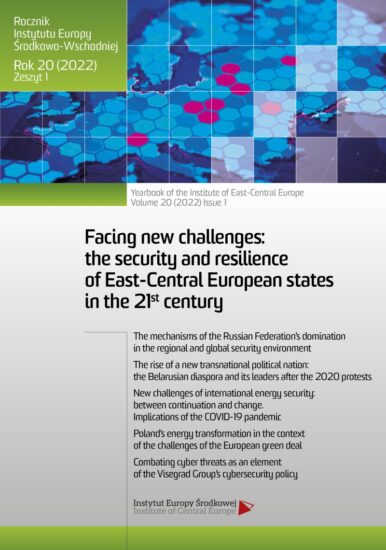Nowe wyzwania międzynarodowego bezpieczeństwa energetycznego: między kontynuacją a zmianą. Implikacje pandemii COVID-19
ORCID: Justyna Misiągiewicz: 0000-0003-0224-2735
Pages: 57-77
Edition: Lublin 2022
DOI: https://doi.org/10.36874/RIESW.2022.1.4
Citation method: J. Misiągiewicz, New challenges of international energy security: between continuation and change. Implications of the COVID-19 pandemic, „Rocznik Instytutu Europy Środkowo-Wschodniej” 20(2022), z. 1, s. 57-77, DOI: https://doi.org/10.36874/RIESW.2022.1.4.
Keywords: COVID-19, energy market, energy security, energy transformation, VUCA
Abstract:
The main research objective of the presented study is to analyse, in accordance with selected theoretical and methodological assumptions, the main challenges of international energy security. This will be possible thanks to a comprehensive analysis in the explanatory and predictive dimension. Analyses of energy security issues take into account long-term development trends as well as unpredictable events related to the functioning of infrastructure and energy technology. Thus, unexpected, sudden phenomena resulting from the dynamics of the international environment gain in importance. The energy security policy has been narrowly defined so far, and thus the issue of thinking in terms of various development opportunities in the raw materials industry is often overlooked. The dilemma related to “non-linear” thinking often ignores a variety of solutions that, taken together, can cause a radical turn in the energy market and its evolution. The methodological framework of the conducted research included research methods appropriate to the science of international relations. The factor method was useful in identifying the determinants of energy security redefinition in the contemporary world. The prognostic analysis turned out to be helpful in the part of the thesis on the prospects for the development of energy security.
Bibliography:
Bieliszczuk B., Załamanie cen ropy naftowej – konsekwencje gospodarcze i polityczne, “Biuletyn PISM” 2020, no. 71.
Buzan B., Rethinking Security after the Cold War, “Cooperation and Conflict” 1997, vol. 32, no. 1.
Buzan B., Wæver O., de Wilde J., Security: a new framework for analysis, Boulder 1998.
Ciuta F., Conceptual notes on energy security: Total or banal security?, “Security Dialogue” 2010, vol. 41, no. 2.
Clean Energy Progress Report, OECD/IEA 2011.
Clean Energy Technologies, OECD/IEA 2016.
Colonomos A., Selling the Future. The Perils of Predicting Global Politics, Hurst 2016.
Heinonen S., Karjalaien J., Routsalainen J., Steinmuller K., Surprise as the normal – implications for energy security, “European Journal of Futures Research” 2017, no. 5/12.
Hoffmann T., Magierek D., Polityka energetyczna Unii Europejskiej w wybranych teoriach badawczych, [in:] Między ewolucją a rewolucją – w poszukiwaniu strategii energetycznej, J. Maj, P. Kwiatkiewicz, R. Szczerbowski (eds.), Poznań 2015.
Hughes L., The Politics of Energy and Climate Change, [in:] The Oxford Handbook of Energy Politics, K. J. Hancock, J. E. Allison (eds.), Oxford 2019.
Keohane R., Power and Governance in a Partially Globalized World, London 2002.
Kissinger H., Years of upheaval, Boston 1982.
Klare M.T., Energy Security, [in:] Security Studies: An Introduction, P.D. Williams (ed.), London–New York 2008.
Kocon M., Wpływ kultury energetycznej na bezpieczeństwo energetyczne kraju. Rynki energetyczne Litwy, Francji i Niemiec, [in:] Bezpieczeństwo energetyczne wyzwaniem XXI wieku, Z. Lach (ed.), Warsaw 2013.
Mack O., Khare A., Krämer A., Burgartz T., Managing in a VUCA World, New York–London 2015.
Młynarski T., Bezpieczeństwo energetyczne i ochrona klimatu w drugiej dekadzie XXI wieku, Cracow 2017.
Myers N., Ultimate Security: The Environmental Basis of Political stability, London–New York 1993.
Neag M.M., Halmaghi E.E., Cucuiet P., Contributions on the determination of the relationship among globalization, sustainable development and energy security, “Scientific Bulletin” 2017, no. 1 (43).
Pietraś M., Bezpieczeństwo ekologiczne w Europie: studium politologiczne, Lublin 2000.
Pietraś M., Bezpieczeństwo międzynarodowe, [in:] Międzynarodowe stosunki polityczne, M. Pietraś (ed.), Lublin 2006.
Pietraś M., Hybrydowość późnowestfalskiego ładu międzynarodowego, [in:] Późnowestfalski ład międzynarodowy, M. Pietraś, K. Marzęda (eds.), Lublin 2008.
Pietraś M., Międzynarodowy reżim zmian klimatu, Torun 2011.
Pronińska K., Nowe problemy bezpieczeństwa międzynarodowego: bezpieczeństwo energetyczne i ekologiczne, [in:] Bezpieczeństwo międzynarodowe, R. Kuźniar, A. Bieńczyk-Missala, R. Balcerowicz (eds.), Warsaw 2012.
Riedel R., Bezpieczeństwo energetyczne we współczesnej securitologii, [in:] Bezpieczeństwo energetyczne Europy Środkowej, P. Mickiewicz, P. Sokołowska (eds.), Toruń 2010.
The impacts of the COVID-19 crisis on global energy demand and CO2 emissions, Global Energy Review 2020, https://www.iea.org/topics/world-energy-outlook.
Ulman R., Redefining Security, “International Security” 1983, vol. 8, no. 1. World Energy Outlook 2021, https://www.iea.org/reports/world-energy-outlook-2021.
Yergin D., Energy security and markets, [in:] Energy and Security: Toward a New Foreign Policy Strategy, D. Goldwyn, J. Kalicki (eds.), Washington 2005.
Yergin D., Ensuring Energy Security, “Foreign Affairs” 2006, vol. 85, no. 2.

PDF: Download